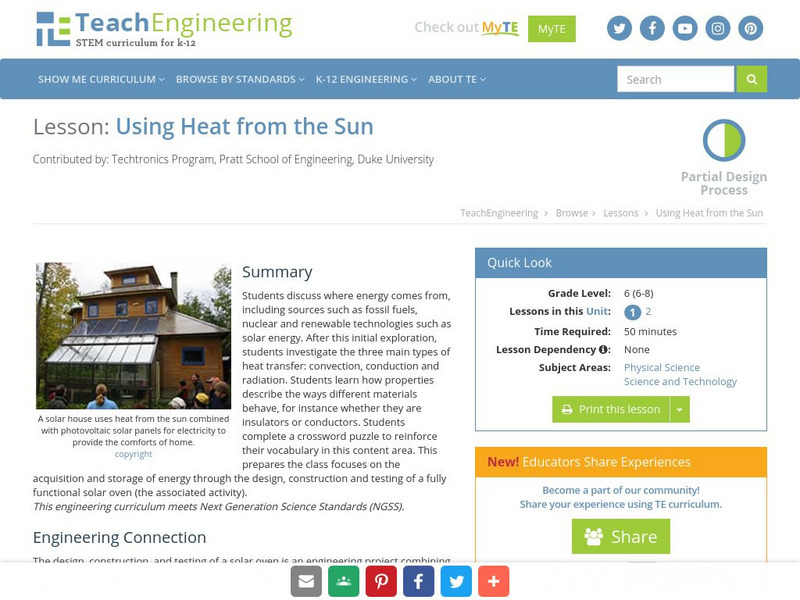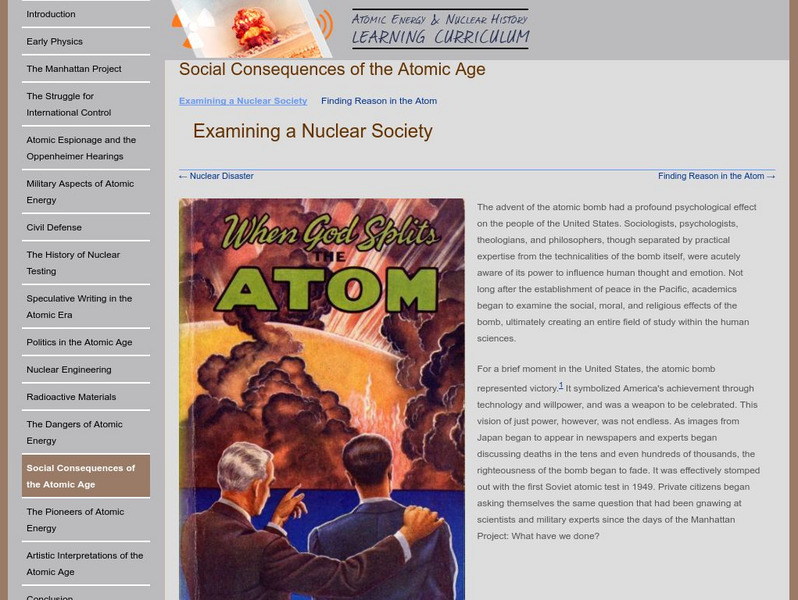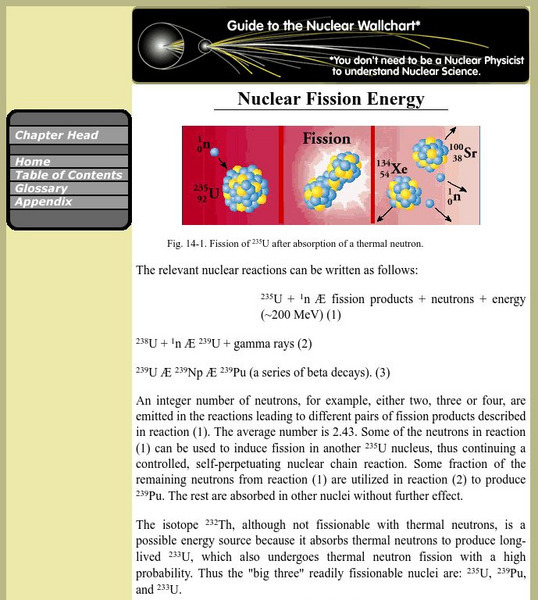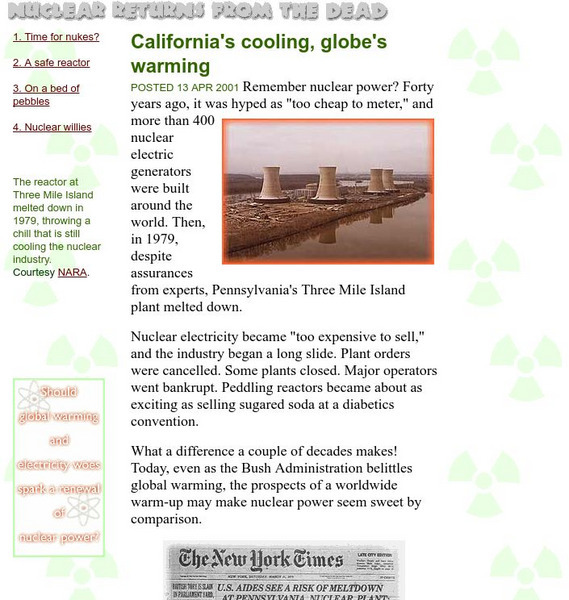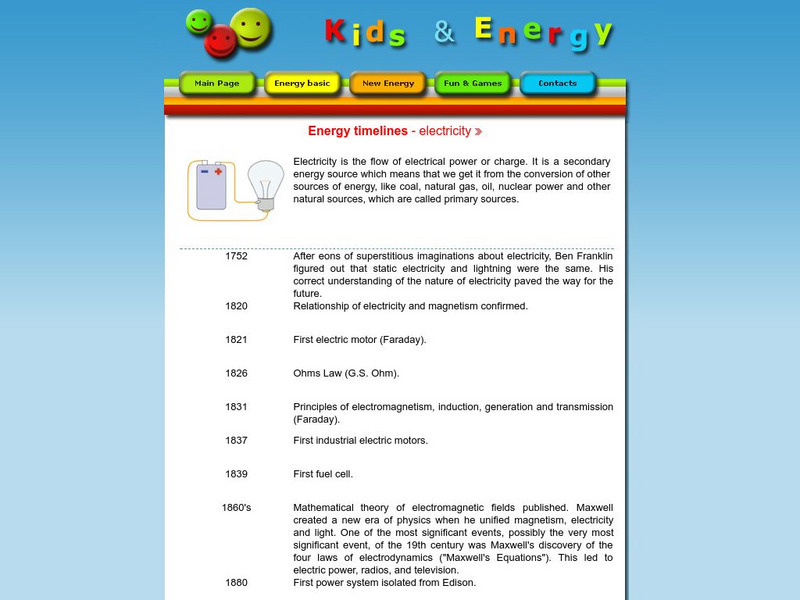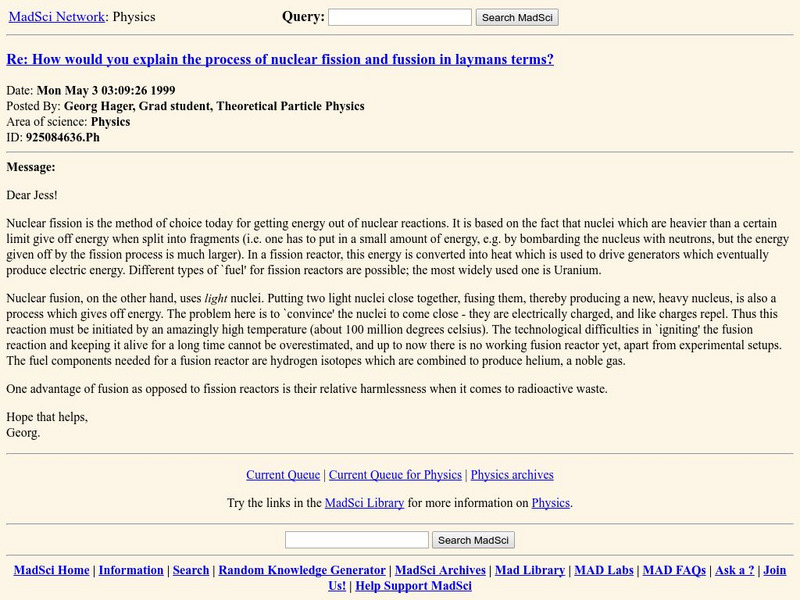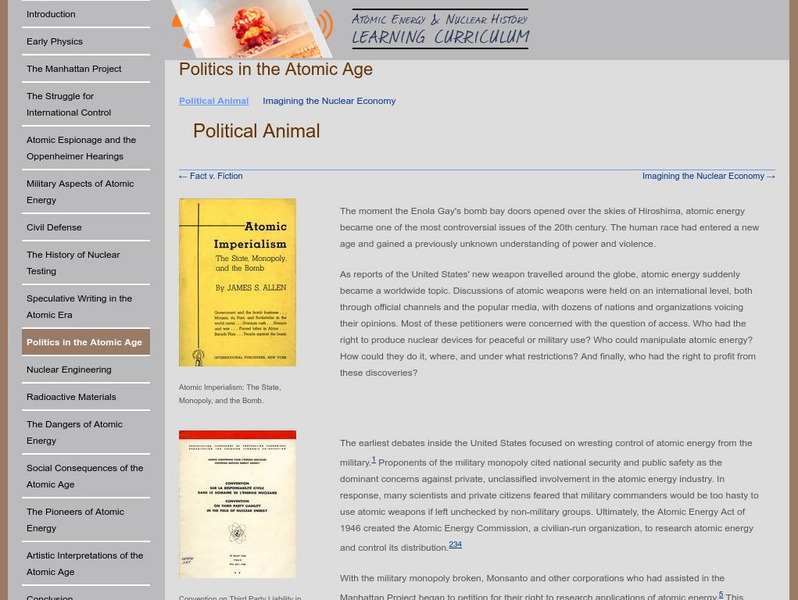Quizlet
Quizlet: 6th Grade Science: Energy Vocabulary: Match
In this interactive game, students match 17 terms related to energy with their definitions. These include the following: Kinetic, Sound, Potential, Elastic potential, Chemical, Gravitational Potential, Electrical, Light, Energy, Energy...
NASA
Nasa: Exploring Climate Change
Test your knowledge of energy and its role in Earth's climate system with these interactive quizzes.
Other
Uso Eficiente De Energia Electrica
Learn about the efficient use of electric energy in Spanish. See the products and services responsible for saving energy.
State Energy Conservation Office-Texas
Seco: Environmental Pollutants From Electricity Production [Pdf]
Facts about some major environmental pollutants produced by power plants, and what consumers can do to lower the carbon footprint from their energy use.
PBS
Pbs: Splitting the Atom
This site offers a brief history of the discovery and application of atomic and nuclear energy - both military and peaceful. It follows the spread of nuclear development among the major world players of the 20th century. Great site for...
TeachEngineering
Teach Engineering: Using Heat From the Sun
In this lesson, students will first discuss where energy comes from, including sources such as fossil fuels, nuclear, and such renewable technologies as solar. After this initial exploration, students will investigate the three main...
Encyclopedia of Earth
Encyclopedia of Earth: Plutonium
Information about the element, Plutonium, atomic number 94. Covers physical properties, atomic properties, how abundant it is on the Earth, and details about health-related regulations. Discusses reactor- and weapons-grade plutonium, and...
Other
Chernobyl Children's Project International
The heart-breaking addendum to the Chernobyl accident is that thousands of children were and are still affected by the fallout. Here are the results of an international organization that strives to help these children.
Other
U.s. Nrc: Backgrounder on the Three Mile Island Accident
plant diagram, summary of events, glossary, health effects, impact of accident, current status, background information
Other
Union of Concerned Scientists: Science for a Healthy Planet and Safer World
The official website for Union of Concerned Scientists provides information on environmental issues and suggestions on actions people can take to curb environmental harm.
Encyclopedia of Earth
Encyclopedia of Earth: Uranium
Information about the radioactive element, Uranium, atomic number 92. Describes its history, physical and atomic properties, how abundant it is on the Earth, and permissible exposure limits. Also discusses sources, uses, isotopes,...
Sophia Learning
Sophia: Energy Forms: Lesson 2
This lesson will explain the advantages and disadvantages of generating electricity from various forms of energy. It is 2 of 4 in the series titled "Energy Forms."
Sophia Learning
Sophia: Energy Forms: Lesson 3
This lesson will explain the advantages and disadvantages of generating electricity from various forms of energy. It is 3 of 4 in the series titled "Energy Forms."
Sophia Learning
Sophia: Energy Forms: Lesson 4
This lesson will explain the advantages and disadvantages of generating electricity from various forms of energy. It is 4 of 4 in the series titled "Energy Forms."
Sophia Learning
Sophia: Energy Forms: Lesson 1
This lesson will explain the advantages and disadvantages of generating electricity from various forms of energy. It is 1 of 4 in the series titled "Energy Forms."
Oregon State University
Oregon State: Social Consequences of the Atomic Age
Oregon State University Library online exhibit of books examining a nuclear society.
Lawrence Berkeley National Laboratory
Berkeley Lab: Nuclear Fission Energy
Resource explains and illustrates nuclear fission energy.
University of Wisconsin
The Why Files: Time for Nukes?
The Why? Files article features the alternative energy source nuclear power and discusses the benefits and hazards of nuclear power plants. Also contains additional links for further study.
Energy for Sustainable Development
Esd Bulgaria: Kids & Energy: Energy Timelines: Electricity
A brief history of electricity, a secondary energy source that is produced by converting primary energy sources, such as oil or nuclear power.
MadSci Network
Msn: How Would You Explain the Process?
From the Mad Scientist Network web site. Using a question and answer format, this page explains the differences between nuclear fusion and nuclear fission. The details of each process are sketched in simple language.
Other
Lcid: Comparison of Fission and Fusion Processes
From the Science Teacher's Resource Center. A data sheet tabulating the many differences between nuclear fission and nuclear fusion. Technical information about the nuclear reactions, the mass defect, isotope masses, etc. is included.
ClassFlow
Class Flow: Sources of Energy
[Free Registration/Login Required] In this flipchart, students are introduced to the different sources of energy produced on earth. Students will learn the names of different energy sources, the mechanisms of how each works along with...
CK-12 Foundation
Ck 12: Life Science: 12.30 Nonrenewable Resources
Learn about nonrenewable resources and energy, specifically nuclear power.
Oregon State University
Oregon State University: Politics in the Atomic Age
Oregon State online exhibit on Atomic Energy and Nuclear History features discussion and primary source material on the politics of the Atomic Age, citizen reaction and the Atomic Energy Act of 1946.
Other popular searches
- Nuclear Energy Chernobyl
- Einstein Energy Mass Nuclear
- Nuclear Energy Environment
- Nuclear Energy Activity
- Chemical and Nuclear Energy
- Nuclear Energy Radiation
- Nuclear Energy and Cartoons
- Nuclear Energy Intro
- Nuclear Energy Lesson Plans
- Indian Point Nuclear Energy






